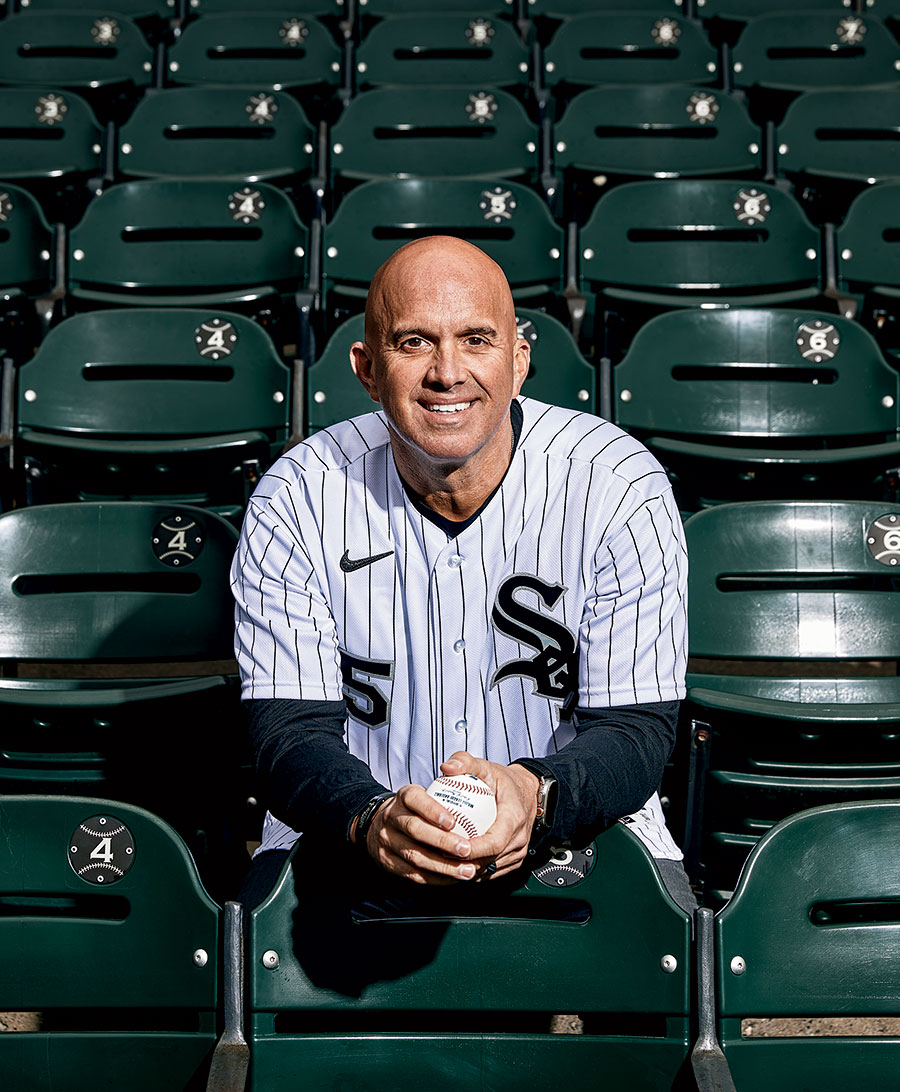If you followed the White Sox last year, it wasn’t fun. Expected to contend for a title, the team didn’t even make the playoffs, sputtering to a .500 record. Everybody (OK, almost everybody) got injured, and the manager was prone to issuing intentional walks on 1-2 counts. That manager, of course, was Tony La Russa, who was unable to finish his 35th season as a major-league skipper due to heart issues.
This year a new face will be calling the shots: first-time manager Pedro Grifol, 53. He comes from the Kansas City Royals, where he was on staff for 10 seasons, most recently as bench coach, and was widely respected. Soft-spoken (in both English and Spanish), Grifol is tasked with restoring joy to a White Sox team that still has high expectations placed on it. He spoke to Chicago about his Cuban heritage, his devotion to a certain author’s self-improvement books, and why catchers (Grifol’s former position) make good managers.
Was baseball your main sport growing up?
Tennis was my first sport and then baseball. When I was around 12, my dad made me choose. We were a poor family, and he said, “I don’t have the money to do both. I don’t even think I have the money to travel with you in tennis, and you’re probably going to need to travel.” So I picked baseball, and that’s all I’ve ever done since. And all I’ve ever done is be a catcher.
Does your dad take any credit for how it all worked out?
All the time. Not only did he make me choose, but he kind of forced me a little bit toward baseball. He says, “If you had chosen tennis, you’d have been in a world of trouble.”
You grew up in Miami, where your dad had immigrated from Cuba. Tell me about that.
He came over in, I think, 1960. He was a “Peter Pan baby.” Cuba sent like 14,000 kids to the United States without their parents. He talks about it all the time. He came with my uncle — I think he was 12 and my uncle was 10. They were here in the United States for probably a year and a half without their parents.
You played nine seasons in the minors but never made it to the majors. You could have quit. What kept you going in baseball?
There’s a small percentage of players that get to the big leagues. And I was one that did not get there. When I was done, I felt I could help those players who are struggling in the minor leagues, to help them get to the major leagues, based on what I went through, what I could have done different. And my passion for the game is just too great. I love this game too much to ever be done with it.
Why do catchers so often become managers?
I’ve given this question a lot of thought. Catching is a position where you have to make 200 decisions a night. You’re calling every pitch, your mind is constantly working, you’ve got to know the game, and you’ve got to know what’s happening in a game, how a pitcher feels or matches up [against each batter]. These are all attributes catchers develop without you knowing you’re developing them.
Everybody — fans, media, etc. — loves to second-guess managers. How do you go home every night and not live with second thoughts or regrets?
You do live with them. You just learn to grow from it. Whoever tells you they don’t live with those decisions, I’d like to talk to them. Even decisions you make that do work, you have to evaluate them, reflect on them, and be honest with yourself. This job doesn’t stop once you go home. I live with it 24/7.
Does your wife ever tell you to stop thinking about baseball?
No, I have to tell her to stop thinking about baseball. When I get home, it’s, “Why did you do this? Why didn’t you do that?” Actually, that’s a really cool thing for me. Sometimes people just tell you what you want to hear. She doesn’t play that game.
When you’re not thinking about baseball, what do you like to do?
I love to read. All kinds of leadership books. Last year I read six or seven books during the season. They were all by Darrin Donnelly [author of the Sports for the Soul self-improvement series]. We read one of his as a [coaching] staff. In Kansas City we had, like, a book club. After a game, we’d come to the hotel and have a meeting for half an hour. We had a gentleman named Matt Marasco [the Royals’ senior director of leadership and cultural development] who led the discussion.
You weren’t with the White Sox last season, but it seemed like the players weren’t having much fun. And baseball’s a game — it should be fun. How do you bring that back?
This is an environment where players come from all over the world, from different cultures. They enjoy different things and they see the world differently. If you allow people to be themselves, this is going to be a joyful environment for them. I’ll always be mindful of that, to make sure I don’t take players away from their culture or cut their personality based on “We don’t allow that here.” Obviously, there’s a respectful line you’ve got to navigate, but this is a hard game — go out and have some fun.
How much have you had a chance to explore Chicago so far?
Last night I went to Chicago Cut. It was great. I’m going to Rose Mary tomorrow. I’m going to the Bulls game today. I went to a Blackhawks game. So I’m starting to get out. I’m definitely going to get to know the city.




